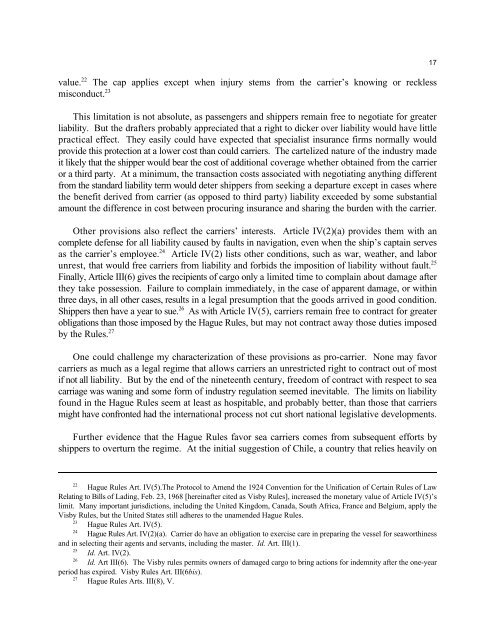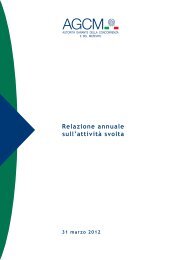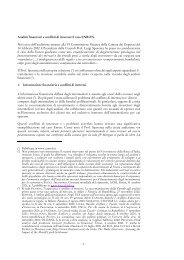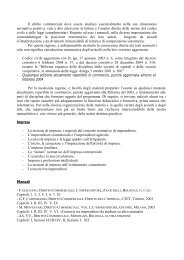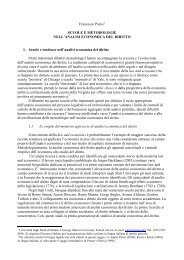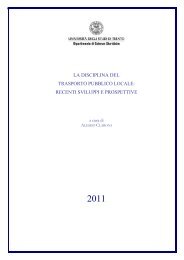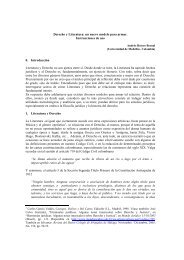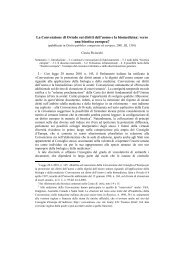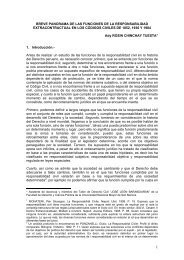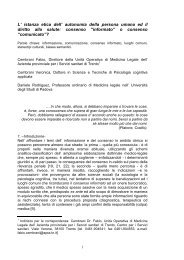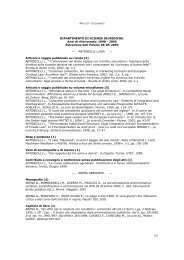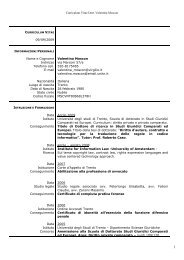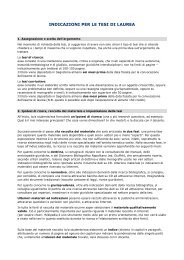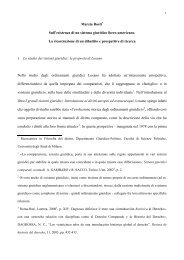The Futility of Unification and Harmonization in International ...
The Futility of Unification and Harmonization in International ...
The Futility of Unification and Harmonization in International ...
You also want an ePaper? Increase the reach of your titles
YUMPU automatically turns print PDFs into web optimized ePapers that Google loves.
22value. <strong>The</strong> cap applies except when <strong>in</strong>jury stems from the carrier’s know<strong>in</strong>g or recklessmisconduct. 23This limitation is not absolute, as passengers <strong>and</strong> shippers rema<strong>in</strong> free to negotiate for greaterliability. But the drafters probably appreciated that a right to dicker over liability would have littlepractical effect. <strong>The</strong>y easily could have expected that specialist <strong>in</strong>surance firms normally wouldprovide this protection at a lower cost than could carriers. <strong>The</strong> cartelized nature <strong>of</strong> the <strong>in</strong>dustry madeit likely that the shipper would bear the cost <strong>of</strong> additional coverage whether obta<strong>in</strong>ed from the carrieror a third party. At a m<strong>in</strong>imum, the transaction costs associated with negotiat<strong>in</strong>g anyth<strong>in</strong>g differentfrom the st<strong>and</strong>ard liability term would deter shippers from seek<strong>in</strong>g a departure except <strong>in</strong> cases wherethe benefit derived from carrier (as opposed to third party) liability exceeded by some substantialamount the difference <strong>in</strong> cost between procur<strong>in</strong>g <strong>in</strong>surance <strong>and</strong> shar<strong>in</strong>g the burden with the carrier.Other provisions also reflect the carriers’ <strong>in</strong>terests. Article IV(2)(a) provides them with ancomplete defense for all liability caused by faults <strong>in</strong> navigation, even when the ship’s capta<strong>in</strong> serves24as the carrier’s employee. Article IV(2) lists other conditions, such as war, weather, <strong>and</strong> laborunrest, that would free carriers from liability <strong>and</strong> forbids the imposition <strong>of</strong> liability without fault. 25F<strong>in</strong>ally, Article III(6) gives the recipients <strong>of</strong> cargo only a limited time to compla<strong>in</strong> about damage afterthey take possession. Failure to compla<strong>in</strong> immediately, <strong>in</strong> the case <strong>of</strong> apparent damage, or with<strong>in</strong>three days, <strong>in</strong> all other cases, results <strong>in</strong> a legal presumption that the goods arrived <strong>in</strong> good condition.26Shippers then have a year to sue. As with Article IV(5), carriers rema<strong>in</strong> free to contract for greaterobligations than those imposed by the Hague Rules, but may not contract away those duties imposedby the Rules. 27One could challenge my characterization <strong>of</strong> these provisions as pro-carrier. None may favorcarriers as much as a legal regime that allows carriers an unrestricted right to contract out <strong>of</strong> mostif not all liability. But by the end <strong>of</strong> the n<strong>in</strong>eteenth century, freedom <strong>of</strong> contract with respect to seacarriage was wan<strong>in</strong>g <strong>and</strong> some form <strong>of</strong> <strong>in</strong>dustry regulation seemed <strong>in</strong>evitable. <strong>The</strong> limits on liabilityfound <strong>in</strong> the Hague Rules seem at least as hospitable, <strong>and</strong> probably better, than those that carriersmight have confronted had the <strong>in</strong>ternational process not cut short national legislative developments.Further evidence that the Hague Rules favor sea carriers comes from subsequent efforts byshippers to overturn the regime. At the <strong>in</strong>itial suggestion <strong>of</strong> Chile, a country that relies heavily on1722Hague Rules Art. IV(5).<strong>The</strong> Protocol to Amend the 1924 Convention for the <strong>Unification</strong> <strong>of</strong> Certa<strong>in</strong> Rules <strong>of</strong> LawRelat<strong>in</strong>g to Bills <strong>of</strong> Lad<strong>in</strong>g, Feb. 23, 1968 [here<strong>in</strong>after cited as Visby Rules], <strong>in</strong>creased the monetary value <strong>of</strong> Article IV(5)’slimit. Many important jurisdictions, <strong>in</strong>clud<strong>in</strong>g the United K<strong>in</strong>gdom, Canada, South Africa, France <strong>and</strong> Belgium, apply theVisby Rules, but the United States still adheres to the unamended Hague Rules.23Hague Rules Art. IV(5).24Hague Rules Art. IV(2)(a). Carrier do have an obligation to exercise care <strong>in</strong> prepar<strong>in</strong>g the vessel for seaworth<strong>in</strong>ess<strong>and</strong> <strong>in</strong> select<strong>in</strong>g their agents <strong>and</strong> servants, <strong>in</strong>clud<strong>in</strong>g the master. Id. Art. III(1).25Id. Art. IV(2).26Id. Art III(6). <strong>The</strong> Visby rules permits owners <strong>of</strong> damaged cargo to br<strong>in</strong>g actions for <strong>in</strong>demnity after the one-yearperiod has expired. Visby Rules Art. III(6bis).27Hague Rules Arts. III(8), V.


